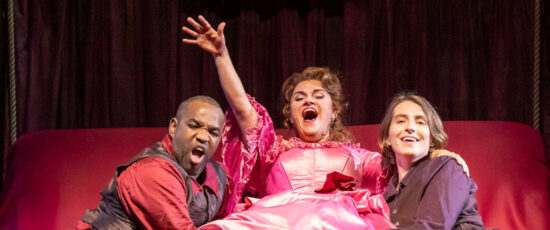
Commentary: No Chicago arts presenter deserves the success of its current season more than Lyric Opera, which in March of 2020 was forced, by the onset of Covid, to cancel its “Ring” cycle, a gargantuan undertaking involving Richard Wagner’s four-chapter mythical saga. The company capped its autumn offering with a dazzling go at Rossini’s comedy, in Bartlett Sher’s Metropolitan Opera production, designed by Michael Yeargan and revived here by Kathleen Smith Belcher.
Read the full story »Classical + Opera »
Verdi’s ‘Don Carlos’ at Lyric Opera of Chicago: Epic French version is potent despite stark set
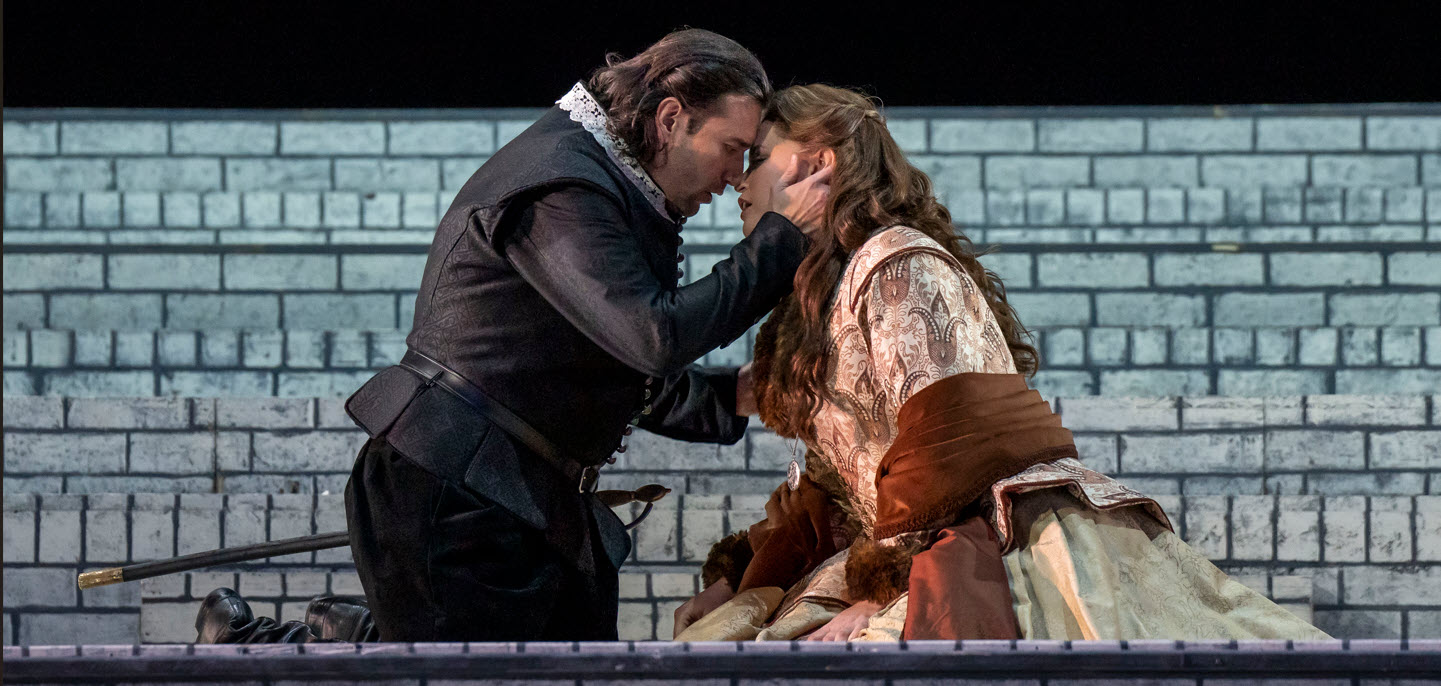
Tenor Joshua Guerrero and soprano Rachel Willis-Sørensen are star-crossed lovers Carlos and Elisabeth in Verdi’s “Don Carlos” at Lyric Opera of Chicago. (Todd Rosenberg photos)
Review: “Don Carlos” by Giuseppe Verdi, Joseph Méry and Camille du Locle, at Lyric Opera of Chicago through Nov. 25. ★★★★
By Nancy Malitz
Opera and theater lovers who know Verdi hits such as “Rigoletto,” “Il trovatore,” and “La traviata” are often surprised to learn how he sometimes made changes for years after their premieres. Not only to adjust for the limitations of a country’s customs, or a singer’s particular gifts, or the censor of the day. But also, occasionally, to pursue something fundamental, perhaps yet unrealized by the composer himself, just waiting to be brought into focus.
Verdi’s “Don Carlos” seems like such a work. Now playing at Lyric Opera of Chicago, it first showed up in 1867 – in Paris and in French as “Don Carlos,” and then in London in Italian as “Don Carlo” – both in that first year. But Verdi was hardly done refining. By the time of its final-final adjustments, for Modena in 1886, Verdi had used six writer-collaborators. He had also begun a new collaborative partnership with the brilliant composer-librettist Arrigo Boito, whose direct impact on Verdi would become apparent in “Otello” and “Falstaff,” the supreme efforts of the composer’s eighth decade. (When Verdi died in 1901, Boito was at his bedside.)
Boito did not pen a word in “Don Carlos.” (The composer was working with librettists Joseph Méry and Camille du Locle.) But in Verdi’s most profound scenes – which capture the irreconcilable anger between King Philip and his thwarted son, and between this same King and the Church’s terrifying Grand Inquisitor, from whom not even a King dared to shrink – one senses the impact of Boito’s influence. And considering that you’ve also got star-crossed lovers in the King’s son Don Carlos and the woman who is all but ripped from Carlos’ arms to be wedded by the father instead, there’s stuff worthy of Shakespeare in the telling. Read the full story »
Post-pandemic, CSO playing at familiar peak, but audiences have thinned at Orchestra Hall
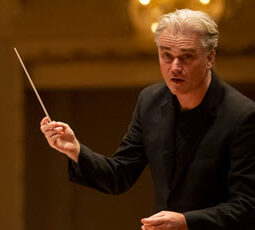
Commentary: October ended and November began with a sizable qualitative swing in concerts by the Chicago Symphony at Orchestra Hall. What was constant, and troubling, was the sea of empty red seats. Even going back to the beginning of October, when music director Riccardo Muti was on the podium, the house looked light – something that would have been unimaginable pre-pandemic.
Chicago Shakespeare: Solving the ‘problem,’ but creating others, in ‘Measure for Measure’
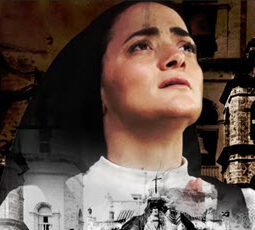
Review: CST’s aggressively distilled “Measure for Measure” is a light version that brings to mind the Metropolitan Opera’s condensed, English-language version of Mozart’s “The Magic Flute,” readily consumable by the whole family. (Not here, though.) In the case of “Measure for Measure,” there’s an argument for boiling it down to essential lines and action. This treatment directed by Henry Godinez skips along at a good clip, extracting lively theater from a rather ponderous “lesson” text. ★★★
As speculation on Muti’s successor ramps up, rumor mill offers a spin: He may not be leaving
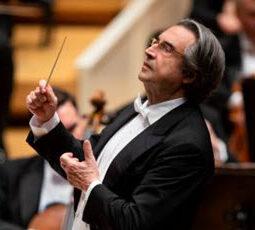
Commentary: Riccardo Muti’s nominal final season as music director of the Chicago Symphony Orchestra commenced with a dazzling first wave of concerts capped by the announcement of an extensive North American tour in January. Then, no sooner had Muti wrapped up his first three weeks at Orchestra Hall than the British website Slipped Disc posted a hot rumor that Muti isn’t going anywhere after all – that the CSO intends to title him music director emeritus and that he will have a significant presence in Chicago for the 2023-24 season. The CSO’s comment, in essence: Stay tuned.
After a dozen years, impact of Riccardo Muti
on CSO can be heard in large ways and small

Review: An account of the Chicago Symphony Orchestra’s concert Sept. 29 with music director Riccardo Muti could begin at any point in the program of works by Rossini, Mozart and Prokofiev – and the gist would be the same. Whether heard as a display of musical elegance, style and wit or as an exercise in sheer sonorous splendor, the whole effect, front to back, was spectacular. No soloist. None needed. The purely orchestral exhibition spoke volumes about why this orchestra led by this conductor is very special.
Sharing stage time in Lyric’s early autumn: Vocally splendid Verdi and a fresh ‘Fiddler’
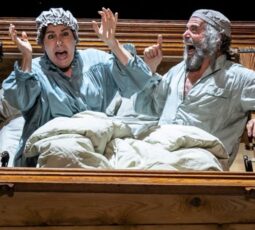
Review: Giuseppe Verdi’s 1844 opera “Ernani” could hardly be conducted, directed or sung more beautifully than it is at Lyric Opera of Chicago, where a quartet of lead singers make some all but impossible scenarios ring true under the leadership of music director Enrique Mazzola and theatrical director Louisa Muller. The opera classic has been sharing the Lyric stage with the musical “Fiddler on the Roof” in a riveting directorial treatment by the Australian Barrie Kosky, whose “Fiddler” puts the 19th-century story in a 21st-century envelope. Both shows: ★★★★
Muti’s crowning year as CSO music director begins with a flourish, and more is just ahead
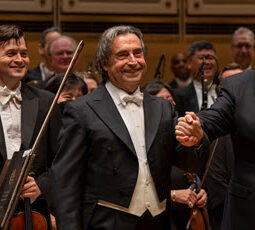
Review: The Chicago Symphony Orchestra opened its 2022-23 season, Riccardo Muti’s last as music director, collaborating with pianist Yefim Bronfman in Brahms’ Piano Concerto No. 1 in D minor. Allowing that a “definitive” account doesn’t exist in the universe of the performing arts, we surely might hedge with the word consummate in describing the musicianship, poetics and interpretative authority on display in that splendid and riveting performance.
At Cliburn competition finals, blazing talent
ruled as world politics hovered in the wings
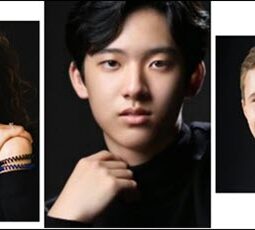
Report: Mid-June heat was on in the entire middle third of the country, all the way from Chicago, where temperatures hit the upper 90s, to Fort Worth, Tex., which saw daytime highs in the triple digits. The heat was on in Fort Worth’s Bass Performance Hall as well, as 30 pianists from around the world competed at the 16th quadrennial Van Cliburn International Piano Competition. It all came down to the intense drama of six finalists vying for the gold medal: two Russians (neither currently living in their home country) and a Ukrainian, as well as one apiece from the U.S., Belarus and South Korea.
Haymarket Opera lifts the veil from Bologne’s ‘L’Amant anonyme’ to reveal a comedic gem
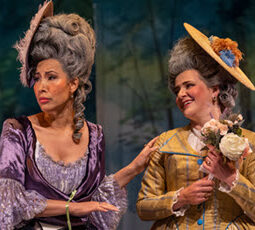
Review: Haymarket Opera Company’s delightful production of Joseph Bologne’s “L’Amant anonyme,” in the perfectly proportioned Jarvis Opera Hall that has become its new home at DePaul University, brought to mind a night at the jewel-box opera at Versailles, outside Paris. Not so ornate as Versailles perhaps, no cozy little boxes from which to view the proceedings. But I suspect Bologne would have relished revisiting this 18th-century comedy – and hearing it sung, and spoken, in such excellent French that he might have thought himself transported back to that time and place. ★★★★
With Muti sidelined, young conductor steps up to lead Chicago Symphony in Brahms triumph
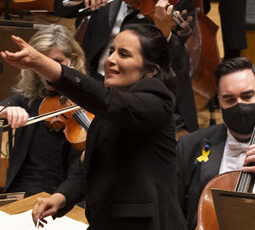
Review: Like the invited guests at the Chicago Symphony Orchestra’s open morning rehearsal on June 16, Lina González-Granados took a seat at Orchestra Hall to watch CSO music director Riccardo Muti lead the troops through Brahms’ Symphony No. 1 in C minor. After a break, the orchestra would be joined onstage by violinist Anne-Sophie Mutter, one of the most celebrated musicians in the world, for a run-through of the Beethoven Violin Concerto, the other work on that evening’s concert program, with Muti on the podium. But that’s not exactly what happened. Muti had tested positive for Covid and was done for the day. González-Granados, his resident conducting apprentice, sprang into action, taking over the rehearsal and scoring an impressive success in the evening concert.
Muti tests positive, cancels CSO concerts; apprentice maestro steps in to lead program
![Muti tests positive, cancels CSO concerts; apprentice maestro steps in to lead program Lina Gonzalez Granados_feature img Todd Rosenberg[8103]](https://chicagoontheaisle.com/wp-content/uploads/2022/06/Lina-Gonzalez-Granados_feature-img-Todd-Rosenberg8103-255x230.jpg)
Report: Riccardo Muti, music director of the Chicago Symphony Orchestra, has tested positive for Covid-19 and has canceled his scheduled concerts with the orchestra June 16-18 at Orchestra Hall, the CSO announced. Stepping in for Muti will be the Chicago Symphony’s Sir Georg Solti conducting apprentice, Lina González-Granados, who will lead the originally scheduled program of Brahms’ Symphony No. 1 and the Beethoven Violin Concerto with soloist Anne-Sophie Mutter.
With her Third String Quartet, Amy Wurtz sees extension of legacy of Beethoven and Bartók
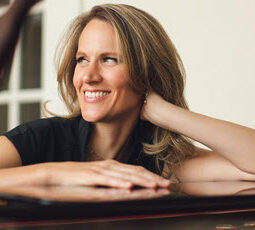
Preview: In 2014, the Chicago-based American Music Project (AMP) launched a new program to periodically showcase all-but-forgotten gems by American composers of the 20th and 21st centuries, and to commission new musical works, as well. After a Covid-induced hiatus, the Project will relaunch June 5 at Ganz Hall with a concert by the Chicago-based Kontras Quartet in a wild mix of music by composers old and new. The agenda includes a world premiere by Chicago composer and pianist Amy Wurtz, whose String Quartet No. 3 is the Project’s latest commission.
Theater for two: Kids in search of themselves, and a pop-up polemic that goes off the rails
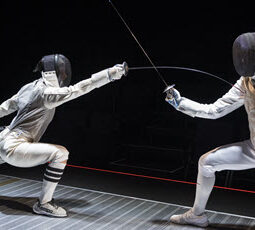
Reviews: Plays for two actors, known in the theater world as two-handers, make special and perhaps obvious demands on the players, the director and certainly the playwright. Placing the whole burden of a play’s instigation, elaboration and denouement on two speakers is to set a high bar for success, as demonstrated by Gracie Gardner’s “Athena” at Writers Theater and Lloyd Suh’s “The Chinese Lady” at TimeLine Theatre. The former stumbles when it abandons language for physicality; the latter veers from charm and wit into polemic, wit driven out by cant. “Athena” ★★ “The Chinese Lady” ★★
Fresh feathering of Chekhov’s ‘Seagull’ turns debut of Steppenwolf space into mottled affair
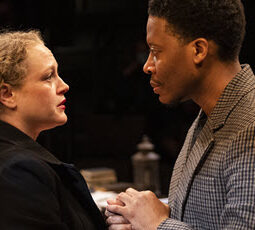
Review: There has been a steady stream of English renderings of “The Seagull” since the comedy – Chekhov’s own term – first saw light in 1896. Now Steppenwolf Theatre adds to that catalog with an adaptation created by ensemble member Yasen Peyankov, the opening flourish for the company’s splendid new in-the-round Ensemble Theater in its grand new building next door to the old one on North Halsted. I came away from this “Seagull” – Peyankov has dropped “The” – with mixed impressions from every perspective. ★★
Latino brothers in flight from a white world, eluding death in existential ‘Last Hermanos’
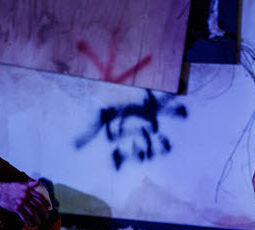
Review: Miguel and his brother Julio are in a bad place, two Latinos on a desperate run from pursuers who want to catch them before they can make it across the border to Mexico and safety. The hunters on their trail may be federal agents, or they could be hired guns, or perhaps even white vigilantes out to expunge the countryside of any and all Latinos. That part is not entirely clear in Exal Iraheta’s gripping play “Last Hermanos.” It really doesn’t matter. Somebody is closing in on the brothers, and their flight has stalled. ★★★★
Starry week: CSO violinist Stephanie Jeong steps up, beloved pianist Kissin comes ‘home’
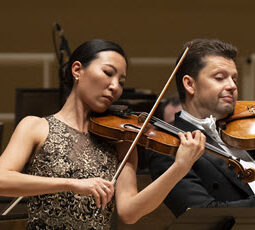
Commentary: It felt very much like Old Home Weekend at Orchestra Hall when violinist Stephanie Jeong, associate concertmaster of the Chicago Symphony Orchestra, stepped into the spotlight for three concerts, then ceded center stage to one of the world’s preeminent pianists, Yevgeny Kissin, who has become not just a Chicago favorite but something closer to an adopted son.
When rambunctious comedy meets fine cast, all ends well for Bard at Chicago Shakespeare
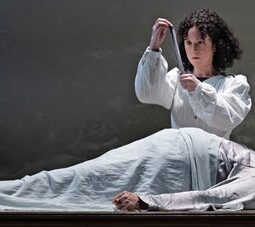
Review: ‘Tis neither fish nor fowl, Shakespeare’s comical-radical and highly problematical play “All’s Well That Ends Well.” Like its main characters, the plot is tormented. Small wonder “All’s Well” has been lumped together with “Measure for Measure,” “Timon of Athens,” “The Merchant of Venice” and a couple of others as “problem” plays. When the rhetorical dust settles and the curtain falls, we’re not quite sure what to feel. But Chicago Shakespeare’s production of “All’s Well” goes a long way toward focusing our ultimate reaction by sharpening the comedy. It’s a very funny show. ★★★★
Muti spotlights Black composers, historical
and contemporary, in pair of CSO programs

Commentary: Riccardo Muti’s penultimate podium stint with the Chicago Symphony Orchestra for this season produced a stirring testimonial to the place of Black composers in the overdue reordering of life in America’s concert halls. On view was the work of three impressive artists: the historical figures Florence Price and William Grant Still and the CSO’s masterful composer in residence, Jessie Montgomery.
For seamstress at the end of her thread, love betrays wrinkles, snags in ‘Intimate Apparel’
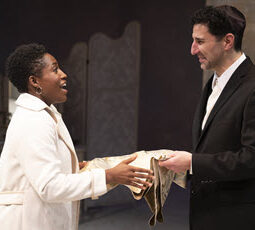
Review: Director Tasia A. Jones likens Lynn Nottage’s play “Intimate Apparel” to old photographs of ordinary people, Black people, who once lived and loved, who were needful of love, who had hopes and dreams. People who lived and died and disappeared, but whose lives mattered. I might add to that plainly spoken insight the flaws and folly of those folks, as well as their basic goodness. Such are the multifaceted, profoundly human images that register in Northlight Theatre’s magnificent framing of “Intimate Apparel,” as finely crafted a show as I’ve seen on that stage.★★★★★
Van Zweden paces Chicago Symphony across sweeping and desolate plain of Mahler Sixth
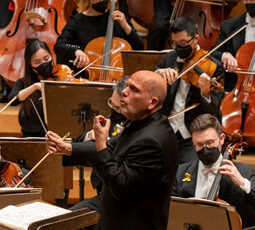
Review: Gustav Mahler liked to say that in his symphonies he created whole worlds. Immoderate as that may sound, it’s at least true that his Sixth Symphony filled the whole stage at Orchestra Hall when the Chicago Symphony Orchestra performed the work April 22 with conductor Jaap van Zweden. Indeed, the sprawling 80-minute Sixth Symphony, the only work on the program, filled the whole weekend — with four performances rather than the typical three for CSO subscription programs. Like his works, Mahler’s popularity is vast.
Meteoric maestro Klaus Mäkelä blazes through with CSO, and we’re back in his orbit next year
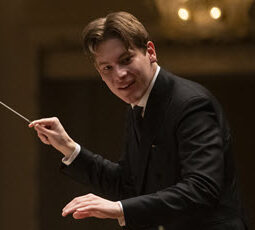
Commentary: Mark the name of Finnish conductor Klaus Mäkelä, and draw a heavy red circle around the weekend of Feb. 16-18, 2023, when he returns for his second appearance with the Chicago Symphony Orchestra. As his CSO debut April 14 displayed generously, this 26-year-old conductor is special. His exquisite reading of Stravinsky’s complete ballet “The Firebird” was like Page 1 news. By the end of that 45-minute demonstration of brilliance, maturity and imagination, I was sold. I was also at the back of a long line of admirers.
Wives of Henry VIII reassess a bloody chapter in high-energy, smartly crafted musical ‘Six’
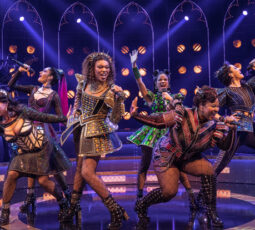
Review: A half-dozen descriptors leap to mind as I attempt to describe the musical “Six.” Supercharged, smart, funny, provocative, keen-edged, scintillating, seriously insightful. Oh, wait, that’s more than six. But then “Six” is more than the six characters – the wives of England’s 16th-century King Henry VIII – who give the show its title. It’s greater than the sum of its parts: an infectious show with a youthful vibe that even I, some decades beyond its target audience, would readily go back to enjoy again. ★★★★★
Pianist Yuja Wang delivers an electric recital, then makes it a party with blizzard of encores
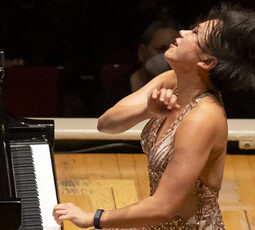
Review: Yuja Wang is a pianistic tiger, a technical wizard and, not least, an indefatigable and audience-savvy performer who can leave 2,000 listeners in a collective meltdown. But if that were the sum of one’s account of her recital April 10 at Orchestra Hall, it would be lacking by half. This remarkable and indeed complete pianist also possesses an unfailing poetic sensibility, a precisely gauged and unerring touch at any speed and a sure grasp of structure. Her formidable program, capped by eight encores, was an immersive delight.
Opera bio-drama ‘Fire Shut Up in My Bones’ throws heat as it casts a spell on Lyric stage
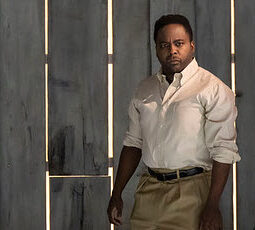
Review: The Lyric Opera of Chicago has had its share of tough breaks in recent years, with ambitious projects felled by Covid including an international Wagner “Ring” festival that had been many years in the making. But what this determined company has accomplished since then is balm to the soul in an uneasy world. On the boards now through April 8 is a stunning success, a not-to-miss opera with a magnificent heart, “Fire Shut Up in My Bones.” ★★★★★
As Andrew Davis leads the Beethoven Ninth, spirit of Lyric Opera’s family spreads the joy
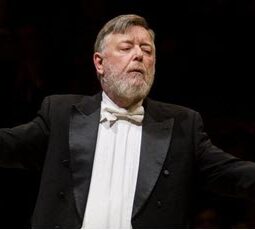
Review: It was supposed to have happened some time ago, a time that dissolved into the miasma of Covid, before the curtain came down most unceremoniously on conductor Andrew Davis’ 20-year stint as music director of Lyric Opera of Chicago. This was to have been his fitting exit, his personal coda — a performance under his leadership of Beethoven’s Symphony No. 9 in D minor with the Lyric Opera Orchestra and Chorus. Finally, it all came to fruition April 1 at the Lyric Opera House, a titanic account of the Beethoven Ninth before a large and deeply appreciative audience.
When salesman’s wife confronts his mistress, comedy flashes – and then nobody’s laughing

Review: On its fragile surface, Eleanor Burgess’ “Wife of a Salesman” appears to be a clever and moderately provocative riff on Arthur Miller’s “Death of a Salesman.” It isn’t exactly a sequel to Miller’s play, but more of an interlude, a sort of off-stage, between scenes flight of fancy: What might have gone down if Willy Loman’s long-suffering wife had confronted some dame with whom he was consorting on his road trips? ★★★
CSO punctuates its 2022-23 season with ‘new,’ Riccardo Muti bids farewell as music director
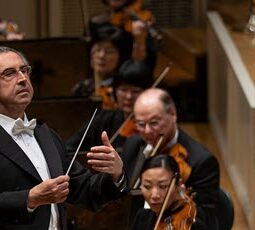
Report: The Chicago Symphony Orchestra’s season plans for 2022-23, announced March 29, bring the twice-deferred conclusion to the Riccardo Muti era at Orchestra Hall. The Italian conductor, who will be about a month shy of his 82nd birthday when his tenure ends in June 2023, will go out in grand fashion with Beethoven’s epic “Missa Solemnis.” Beyond its Beethoven finale and a generous offering of audience favorites under the music director’s baton, the new season also promises the world premiere of a still-untitled work by CSO composer-in-residence Jessie Montgomery, plus several other firsts.
Puccini’s ‘Tosca’ at Lyric Opera of Chicago: Love and death in the pitch and tumult of war
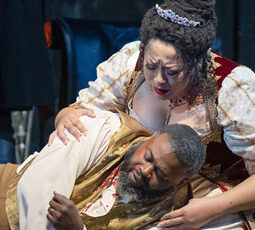
Review: What profound, disturbing harmonies permeate the Lyric Opera House in its current production of “Tosca.” It is wartime Rome, combustible and turbulent. The painter Cavaradossi and his lover, the opera star Tosca, are trapped in history’s maw. Soprano Michelle Bradley as the charismatic diva, tenor Russell Thomas as Cavaradossi and baritone Fabián Veloz as their conniving nemesis Scarpia make a compelling threesome in this vintage Jean-Pierre Ponnelle production. ★★★★
Spring reveals Chicago Symphony a-bloom, with splendors of Bruckner and Mahler ahead
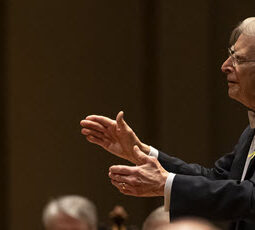
Commentary: The Chicago Symphony Orchestra under full sonorous sail is now, as it has been throughout my lifetime, something to behold. You might say we’re in the CSO’s season of high tide. Just ahead music director Riccardo Muti conducts Bruckner’s Second Symphony, and Jaap van Zweden, music director of the New York Philharmonic, comes in for the Mahler Sixth, an evening in itself. We got a regal reminder of just what this orchestra can summon – its Solti legacy, as I think of it – last week when Herbert Blomstedt conducted a spectacular account of Bruckner’s Symphony No. 4 in E-flat (“Romantic”).
Musical ‘Hadestown,’ updating Orpheus myth, spins dark modernist tale of two dreamy kids
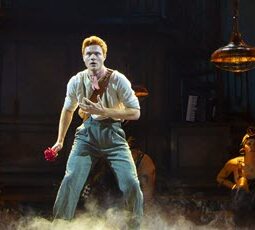
Review: To say the musical “Hadestown” puts a bleak, dark modern spin on the ancient Greek myth of Orpheus and Eurydice would be quite an understatement. This gritty and cynical, albeit musically ample, show, winding up a tour stop here under the aegis of Broadway in Chicago, sends mixed – if not muddled – messages about human nature while also recentering the story’s tragedy. Thkough “Hadestown” is packed with vivid characters and provocatively edgy songs, taken as a whole, as an existential screed, it doesn’t bear very close scrutiny. ★★★
Paavo Järvi, his musical French impeccable, leads CSO in stylish ‘Symphonie fantastique’
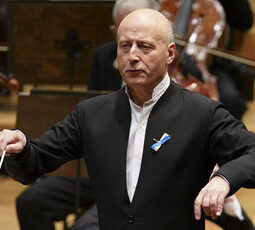
Review: In the art of conducting, stylistic sensibility is an ineffable attribute, elusive but also telling. Its absence tends to be conspicuous, and its presence can transform mere correctness into something singular and marvelous — something like the Estonian-American conductor Paavo Järvi conjured in Berlioz’s “Symphonie fantastique” with the Chicago Symphony Orchestra on March 5 at Orchestra Hall.
Recent Posts
- Lyric Opera’s bright and funny ‘Le Comte Ory’ confirmed the company’s return to full vigor
- Verdi’s ‘Don Carlos’ at Lyric Opera of Chicago: Epic French version is potent despite stark set
- Post-pandemic, CSO playing at familiar peak, but audiences have thinned at Orchestra Hall
- Chicago Shakespeare: Solving the ‘problem,’ but creating others, in ‘Measure for Measure’
- As speculation on Muti’s successor ramps up, rumor mill offers a spin: He may not be leaving
Most Commented
- Role Playing: Janet Ulrich Brooks on nailing the style of a wily Russian in 'A Walk in the Woods'
- Role Playing: City boy Michael Stegall ropes wild cowboy in Raven Theatre’s ‘Bus Stop’
- Role Playing: Kirsten Fitzgerald inhabits sorrow, surfs the laughs in ‘Clybourne Park’
- Role Playing: Sadieh Rifai zips among seven characters in one-woman ‘Amish Project’
- Role Playing: Brent Barrett’s glad he joined ‘Follies’ as that womanizing, empty cad Ben








